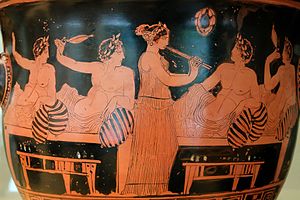**Group 1: Symposium Setting and Social Occasion**
– The Greek symposium was a key Hellenic social institution.
– It was a forum for respected families to debate, plot, boast, or revel.
– Symposia celebrated the introduction of youth into aristocratic society.
– Aristocrats held symposia to mark victories in contests.
– Symposia often took place in the andrōn with participants reclining on couches.
**Group 2: Drinking Customs**
– A symposiarch oversaw the symposium and decided the wine strength.
– Greeks and Romans mixed wine with water.
– Wine was drawn from a krater and served from pitchers.
– Libations were poured in honor of deities or the dead.
– The symposiarch was responsible for preventing excessive drinking.
**Group 3: Pottery in Symposium**
– Attic pottery was often used in symposiums.
– An amphora held the wine, and a single cup was passed among guests.
– Cups used at symposiums were simpler than amphoras.
– Pottery depicted scenes of Dionysus, satyrs, and mythical themes.
– Pottery played a key role in the symposium setting.
**Group 4: Entertainment at Symposium**
– Poetry and music were central to symposium pleasures.
– Female prostitutes and entertainers were hired for performances.
– Instruments like the aulos and barbiton were played.
– Guests engaged in competitive entertainments like kottabos.
– Skolia, drinking songs, and rhetorical contests were common at symposia.
**Group 5: Etruscan and Roman Drinking Parties**
– Etruscan art depicted banqueting scenes similar to Greek symposia.
– Women participated more fully in Etruscan banquets.
– Roman symposia (convivium) differed from Greek symposia.
– Roman symposia allowed women to attend and served wine throughout the meal.
– Etruscan and Roman drinking parties had similarities to Greek symposia.
In Ancient Greece, the symposium (Greek: συμπόσιον, sympósion or symposio, from συμπίνειν, sympínein, "to drink together") was a part of a banquet that took place after the meal, when drinking for pleasure was accompanied by music, dancing, recitals, or conversation. Literary works that describe or take place at a symposium include two Socratic dialogues, Plato's Symposium and Xenophon's Symposium, as well as a number of Greek poems, such as the elegies of Theognis of Megara. Symposia are depicted in Greek and Etruscan art, that shows similar scenes.


In modern usage, it has come to mean an academic conference or meeting, such as a scientific conference. The equivalent of a Greek symposium in Roman society is the Latin convivium.
